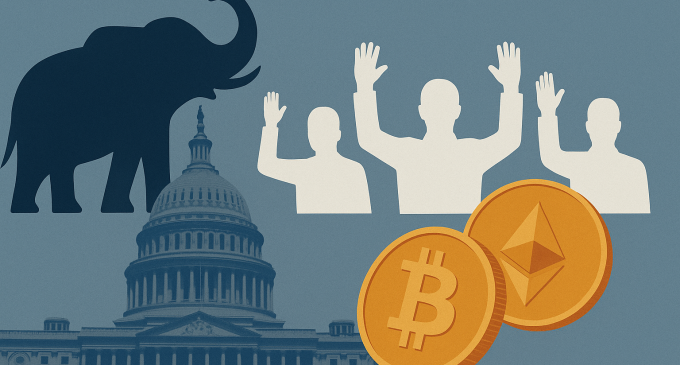
Introduction
In a surprising move that has shaken both Washington insiders and the cryptocurrency industry, the United States House of Representatives failed to move forward on several major cryptocurrency regulation bills. On July 15, 2025, a series of procedural votes were blocked primarily by internal disputes within the Republican party. The blocked legislative packages included the GENIUS Act, the CLARITY Act, and the Anti-CBDC Act—all of which had been considered crucial steps toward providing legal and regulatory clarity for digital assets in the United States.
This political impasse comes at a time when both the crypto industry and U.S. regulators have been calling for more comprehensive oversight of digital assets, especially after the failures of several major crypto exchanges and custodians over the past few years. The legislation, which had bipartisan support in committee phases, was expected to streamline how digital assets are categorized, regulated, and taxed in the U.S. economy. However, internal disagreements among House Republicans have prevented these bills from even reaching a formal floor debate.
Understanding The Crypto Regulation Bills
Before delving into the political gridlock, it is important to understand what these bills aimed to accomplish. The GENIUS Act sought to clearly define the status of various digital assets, including cryptocurrencies and non-fungible tokens (NFTs), within existing U.S. securities laws. It attempted to create a new category of “digital commodities” that would be overseen by the Commodity Futures Trading Commission (CFTC), rather than the Securities and Exchange Commission (SEC).
The CLARITY Act was designed to address the legal confusion surrounding whether cryptocurrencies should be treated as securities, commodities, or something entirely new. This Act proposed a structured framework to help startups and established crypto companies understand their regulatory obligations, thus avoiding enforcement actions stemming from ambiguous legal standards.
Meanwhile, the Anti-CBDC Act, championed by a more libertarian wing of the Republican party, was intended to prevent the Federal Reserve from launching a Central Bank Digital Currency (CBDC). Supporters of the bill argue that a digital dollar could become a surveillance tool that threatens financial privacy, while opponents claim it could modernize the payment system and make monetary policy more effective.
Why Are The Bills Blocked?
Despite earlier bipartisan support in committee, the full House failed to reach a consensus on moving the crypto regulation bills forward. Sources close to the legislative process reveal that the disagreements stemmed not from opposition to regulating crypto itself, but from how these regulations should be framed and which government agencies should take the lead.
One major point of contention was the growing divide between two factions within the Republican party. On one side, establishment Republicans supported the proposed legislation, viewing it as a means to foster innovation, provide investor protection, and ensure U.S. leadership in financial technology. On the other side, a more populist and libertarian wing resisted elements of the bills they perceived as empowering the federal bureaucracy.
These internal party dynamics were further complicated by debates around the Anti-CBDC Act. While many Republicans support the idea of limiting the Federal Reserve’s power, moderate members expressed concern that entirely shutting down the development of a digital dollar would hinder the U.S. from keeping pace with countries like China, which has already launched its own central bank digital currency.
Political Strategy And House Procedures
The decision to block the bills was not necessarily an outright rejection of their contents, but a strategic move related to House procedures. Procedural votes are often used as tools for internal negotiation or to send messages to party leadership. In this case, some GOP members used the vote to express their dissatisfaction with how leadership had handled broader legislative priorities, including appropriations and border security funding.
Without these procedural approvals, the crypto bills cannot move to a full floor vote or debate. This delay leaves the future of the legislation uncertain, even though House Financial Services Committee Chair Patrick McHenry and Senate Banking Committee members had signaled a willingness to compromise on the final wording.
Industry Reaction To The Setback
The cryptocurrency industry responded to the news with a mix of frustration and cautious optimism. Many had hoped that 2025 would finally bring regulatory clarity that would enable long-term planning and encourage institutional adoption of digital assets. Companies that have spent years operating in regulatory gray areas expressed disappointment at yet another delay.
At the same time, industry leaders acknowledged that the debate is far from over. Some firms even welcomed the delay, noting that the current version of the bills may have included provisions that were either too vague or overly burdensome. These stakeholders are now looking to the Senate as the next arena where progress might be made.
Kristin Smith, CEO of the Blockchain Association, remarked that while the legislative process has hit a snag, the fact that these issues are being discussed at the highest levels of government represents real progress. She also emphasized the need for regulators to avoid a punitive approach during this interim period, warning that continued enforcement actions without a clear legal framework would stifle innovation and drive companies overseas.
Implications For The Broader Crypto Market
The failure to pass these bills has both short-term and long-term implications for the crypto market. In the immediate aftermath, market prices for some digital assets dipped slightly, reflecting investor uncertainty. However, the long-term impact may be more structural.
First, without a clear regulatory framework, institutional investors may remain hesitant to enter the space in a significant way. Pension funds, banks, and insurance companies require a high degree of legal certainty before they can expose client funds to new asset classes. The current ambiguity, combined with the SEC’s ongoing enforcement-first approach, creates significant barriers to entry.
Second, the lack of legislation leaves smaller companies vulnerable. Startups working on blockchain-based applications may find it difficult to attract investment or build partnerships if they are unsure whether their tokens could be classified as illegal securities. This uncertainty slows innovation and makes it harder for the U.S. to maintain its competitive edge in financial technology.
Third, regulatory uncertainty also hinders international coordination. Without a unified domestic approach, the U.S. cannot effectively participate in global discussions about crypto standards, taxation, and cross-border enforcement. This opens the door for countries like the United Kingdom, Switzerland, and Singapore to set the tone for global crypto regulation while the U.S. remains stuck in legislative gridlock.
The Role Of The SEC And CFTC
The current impasse in Congress also raises questions about the roles of the Securities and Exchange Commission (SEC) and the Commodity Futures Trading Commission (CFTC) in regulating digital assets. Under the leadership of Chair Gary Gensler, the SEC has pursued an aggressive enforcement agenda, targeting crypto exchanges, DeFi protocols, and token issuers for alleged securities violations.
Critics argue that the SEC’s approach creates confusion and discourages compliance because there is no clear guidance on what constitutes a security in the digital space. On the other hand, the CFTC has advocated for a more cooperative model, emphasizing the need to modernize existing commodities laws to account for new technology.
The now-stalled bills would have clarified these roles by giving the CFTC primary authority over certain types of tokens and trading platforms. With the legislation on hold, the turf war between the two agencies continues, leaving the industry caught in the crossfire.
Senate Outlook And Possible Paths Forward
While the House may have blocked the bills for now, all eyes are turning to the Senate, where some members have expressed a willingness to take up the issue independently. Senator Cynthia Lummis of Wyoming and Senator Kirsten Gillibrand of New York have previously introduced a bipartisan framework that mirrors many of the provisions in the House bills.
The Senate Banking Committee, which has jurisdiction over financial regulation, may choose to refine its own version of the legislation and bring it to the floor in the coming months. If the Senate can pass a crypto bill, it may create pressure on the House to resolve its internal differences and re-engage with the issue.
Another possible path forward involves incorporating crypto regulation into larger legislative packages, such as budget bills or financial modernization efforts. This approach would allow lawmakers to address digital asset issues without holding stand-alone votes that could prove politically divisive.
Conclusion
The House’s decision to block procedural votes on critical crypto regulation bills marks a significant, but not fatal, setback in the effort to bring clarity and structure to the U.S. digital asset market. The political reasons behind the move are rooted in internal Republican divisions rather than outright opposition to regulation, which means the debate is far from over.
Industry participants, investors, and regulators alike will now turn to the Senate for leadership on this issue. In the meantime, the lack of a clear framework leaves companies navigating a complex and uncertain regulatory landscape, with implications for innovation, investment, and international competitiveness.







There are no comments at the moment, do you want to add one?
Write a comment